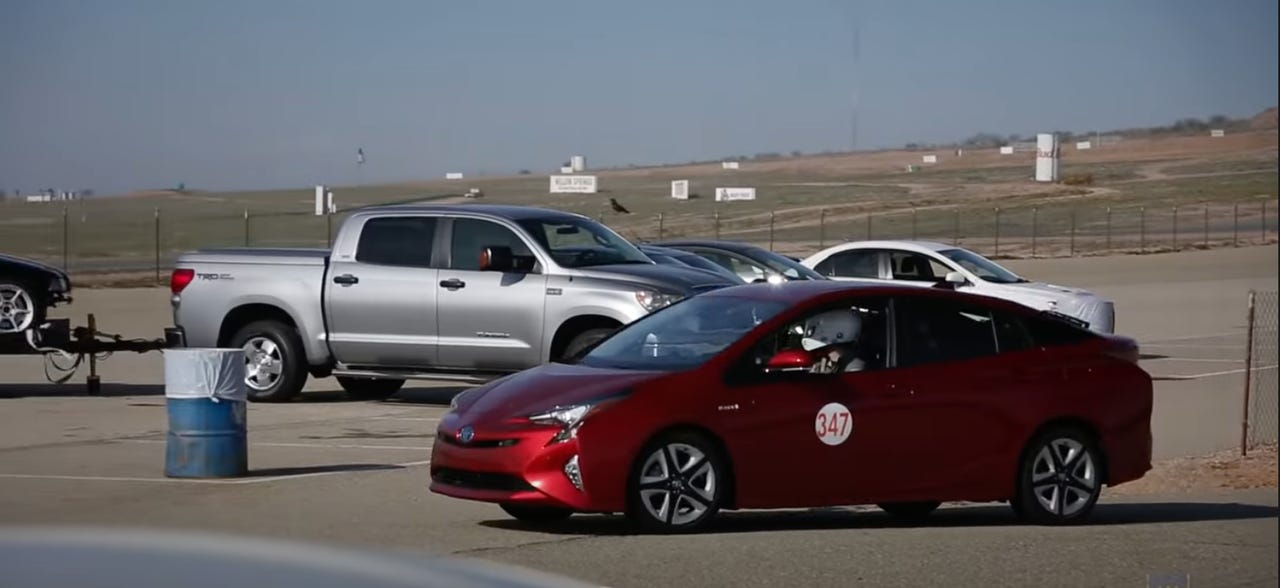Prius drivers have a dirty little secret they don't want you to know about

My other car is a...guzzler?
It's not that they roll down the streets in their Priuses and other hybrid cars, looking like members of the extended family Smuggins.
more Technically Incorrect
No, I admire their commitment to the Earth's salvation.
Yes, too many of them still insist on looking down upon us twisted gassy mortals with pithily sanctimonious license plates such as LESCO2E. Or TNKGLBL. Or GASHATE.
But it's really just the true excitement of the convert.
Yet suddenly I worry, on finding evidence that these people, bathing in their eco-friendly technology, may be just as hypocritical as the rest of us.
A new study led by large brains at the University of Maryland doesn't appear to offer too much hope for the planet. It's entitled "Attribute substitution in household vehicle portfolios."
Yet descend a little deeper and you find a little uplift. It seems that those who buy an eco-cognizant, energy-efficient vehicle have a dirty little secret: Another vehicle that's about as energy efficient as knitting with a trowel.
In essence, these people's second car reduces the eco-benefits of their Prius-axis vehicle by 57%.
Even more delectable is that the researchers used six years of DMV data from the capital of sanctimony: My home state of California.
Seventy-five percent of cars live in multi-car households. This might suggest, given these research results, that most households are built on the Hollywood notion that opposites attract.
The researchers insisted this isn't exactly an example of the so-called diet soda effect -- when someone orders a Diet Coke with their large McDonald's fries. It isn't even solely a message about people who own one hybrid car and one non-hybrid car.
Instead, University of Maryland assistant professor James Archsmith told me: "Because we observe the vehicle holdings of individual households over time, we can explore this relationship across all kinds of two-car households, e.g., a household with crossover and a compact sedan, a household with two hybrids, or a household with a pickup and a large SUV. We see these same broad effects across all types of household vehicle portfolios. When a household replaces a vehicle, they will tend to buy one that is less fuel efficient if the other vehicle they own is more fuel efficient, regardless of the types of vehicles the households own."
The researchers offered even more grim thoughts. Those who buy eco-friendly cars drive them further and more often. Which doesn't exactly help the world, some might mutter.
"The effect of policies intended to mitigate negative external costs from gasoline consumption -- for example, fuel economy standards and so-called 'scrap-and-replace' programs -- may be partly undone by the extensive and intensive margin substitution patterns exhibited by households," said the researchers.
But I'd read several headlines about this research showing that "eco-friendly" car buyers had these hypocritical tendencies. Might this even include Tesla buyers? Surely there's nothing more showily sanctimonious than them.
Archsmith told me: "In terms of the vehicles we considered, there are conventional hybrids (e.g., Priuses) in our sample of vehicles. Due to limitations in our data, we don't have data on households that have battery electrics. I personally think this would be very interesting work to extend to households with battery electrics and am exploring ways to look at it in future work."
He did, however, point me to fascinating, and perhaps contradictory, new research from the University of Chicago. This shows that electric vehicles are driven far less than gas-powered cars -- and certainly far less than regulators expected. One factor, say the researchers, might be the high cost of electricity in states such as, oh, California.
Might this mean, then, that the Tesla is for (expensive) show and the second car -- an SUV, say -- is the one that is, well, the real car?
Of course, we'll all soon be forced to go electric, as some states -- Massachusetts, for example -- are already phasing out the sale of gas-powered vehicles.
But how will car buyers then be able to show off their additional holiness?
"My car burns far fewer kilowatts than yours" stickers?
